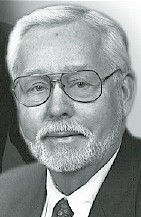The Lord be with you

Gerhard O. Forde (1927-2005) was an ordained Lutheran pastor, theologian, professor at Luther College, and a prolific writer. He was ordained in what came to be called the Old American Lutheran Church (ALC). It is called that because, in 1960, it was the largest Lutheran denomination that merged to become “The” American Lutheran Church. The word “the” distinguished the new denomination from the “old” one. The ALC then merged with the LCA (which was formed in 1962) to form the ELCA in 1988. (Also joining in the merger were some former LC-MS congregations.)
I give this background so you will know that Forde comes from a time when the ALC was a confessional Lutheran denomination and actually in altar and pulpit fellowship with the LC-MS. While he remained in the ELCA, many of his writings were well received in the LC-MS. One of those writings was “The Lord’s Supper as the Testament of Jesus,” which appeared in Word & World, volume XVII, number 1, in the Winter of 1997.
The Last Supper is a center piece in all ecumenical discussions where agreement in doctrine and practice is the goal. In Lutheran piety, the Supper is a central feature. These two observation alone (and more could be added) instruct us in reference to the importance of this Sacrament. Therefore the article of Forde deals with a vital topic.
Though Forde doesn’t spell it out explicitly, no doubt because he had space considerations and so had to assume his readers knew, the main Greek word he focuses on in this article about the Lord’s Supper is “diatheke.” This word can be translated into English as either “testament” or “covenant.” Context determines the proper translation. When the context is in reference to death, then “testament” is the proper translation; like “Last Will and Testament.” When the context is life, “covenant” is the proper translation; like a contract (covenant) for services.
Forde argues that, while other “contexts” may be of value (the first Passover, the Crucifixion, etc.), they all pale in comparison to the actual context of the first celebration of the meal, that is, the night he was betrayed. It is that testament, given on that night, that we are connected with when we celebrate the Lord’s Supper.
Some quotes from the article will give you a taste of it.
Lutheranism has always insisted on the reality of what transpires in the doing of the supper. It is not a representation, not a repetition, not a mere symbolic proceeding, but real. If it is not real it is not gospel.
What happens when Jesus’ followers meet to “do this in remembrance of me” is simply the same thing that happened in the night in which he was betrayed: the last will and testament is distributed to his heirs.
[T]he will of Jesus is carried out, the supper extended now through time to include all Jesus’ heirs in accordance with the will itself. It is … a real event in our time. It is what it says it is: the new testament.
Forde was a theologian, which means he uses words that might not be easily understood by non-theologians like “hermeneutical” and “ontological.” However, he kept them to a minimum and if a reader doesn’t know them they can easily find definitions. The article is only five pages long. Though it isn’t a full treatment of the Lord’s Supper (such a treatment would require a book and such a book would probably be incomplete), it is certainly worth reading.
You can read the article by going to this link:
THE LORD’S SUPPER AS THE TESTAMENT OF JESUS
Blessings in Christ,
Pastor John Rickert
